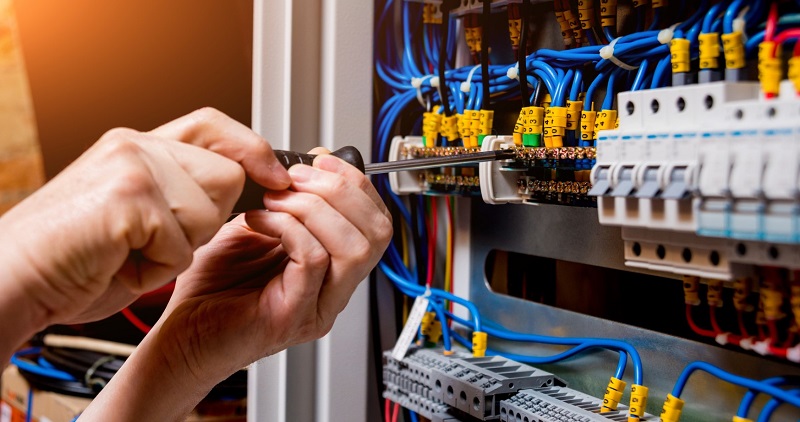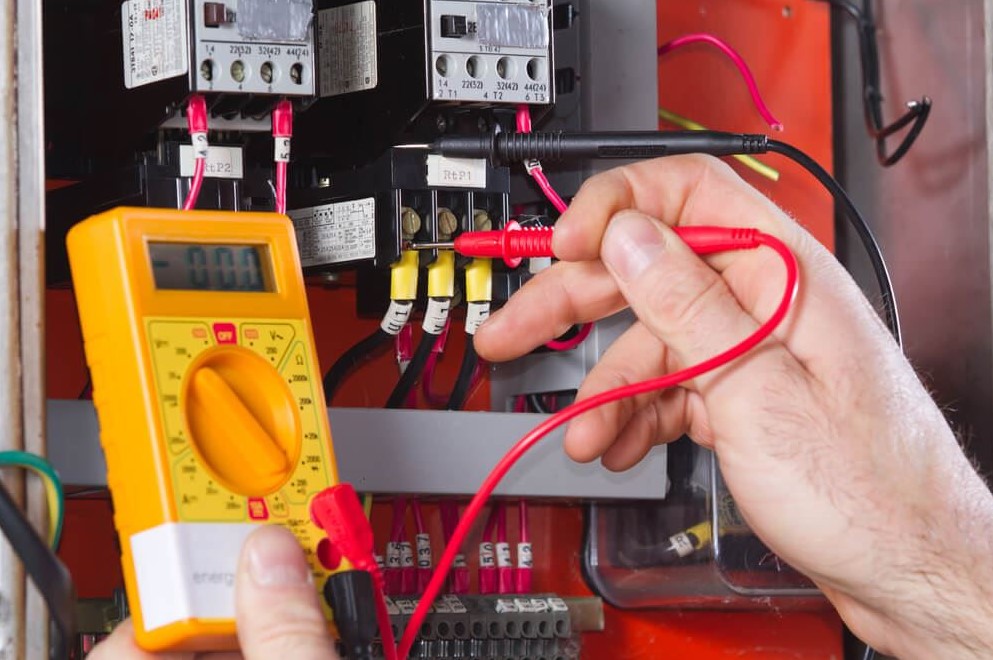Embarking on a career as an electrician can be both rewarding and lucrative, but how long does it take to become one? The journey to becoming an electrician varies depending on the pathway you choose, such as apprenticeships, trade schools, or prior experience.
In this blog post, Derosa Electric will explore the different routes available and provide a comprehensive timeline for pursuing your dream of becoming an electrical professional.
The Process Of Becoming An Electrician
Becoming an electrician involves completing an apprenticeship and meeting on-the-job training requirements while also passing exams and interviews.
Understanding The Apprenticeship Journey
The apprenticeship journey is a crucial part of becoming an electrician, as it combines theoretical knowledge with practical, hands-on experience. Typically taking four to five years to complete, aspiring electricians learn from experienced professionals called journeymen who have already gained mastery in the field.
Throughout the apprenticeship program, learners work on various electrical projects that expose them to diverse wiring systems and safety regulations. This helps build a strong foundation in all facets of electrical work – from residential repairs and installations to commercial maintenance and troubleshooting tasks.
On-the-Job Training Requirements
On-the-job training is an essential part of becoming an electrician. During this phase, apprentices learn how to install and repair electrical systems under the supervision of a licensed journeyman electrician.
This hands-on experience teaches aspiring electricians about wiring systems, safety regulations, and proper electrical troubleshooting techniques.
Throughout their apprenticeship, aspiring electricians must demonstrate proficiency in various areas such as electrical repairs and maintenance. They are also required to attend classroom instruction or online courses that provide theoretical knowledge needed for certification exams.
Exam And Interview Process
To become a licensed electrician, one must go through an exam and interview process. The licensing exam covers the National Electrical Code (NEC), electrical theory, wiring systems, safety regulations, and more.
In addition to passing the licensing exam, prospective electricians may also need to go through an interview process with their potential employer or hiring agency. This interview aims to assess the candidate’s previous education and experience while providing them with an opportunity to showcase any skills relevant to electrical work.
Fast-Track Options For Becoming An Electrician
Fast-track options to become an electrician include vocational schools and training programs, online courses and certifications, as well as prior education and experience.
Vocational Schools And Training Programs
Completing a vocational school or training program in electrical work is an excellent option for those who want to fast-track their career as an electrician. These programs are specifically designed to provide students with the knowledge and skills needed to become proficient in electrical systems, wiring, and safety regulations.
One example of a trade school program for becoming an electrician is the Electrician Technology Associate Degree from Bryant & Stratton College.
Trade schools can lead to various certification levels depending on the program’s duration and requirements. For instance, certificate programs at some trade schools can be completed within four months while others take one year or more.
Furthermore, many of these institutions offer online courses that allow aspiring electricians to study at their own pace while also working full-time.
Note: As an AI language model I don’t have personal experiences so I cannot provide anecdotes but I suggest you include any relevant anecdote based on your expertise while modifying this output
Online Courses And Certifications
As technology continues to evolve, so does the way we learn. Online courses and certifications have become a popular option for those interested in pursuing a career as an electrician.
These programs provide students with flexible schedules and self-paced learning opportunities that can be completed from anywhere with an internet connection. Many universities, vocational schools, and professional organizations offer online courses in basic electrical theory, wiring systems, safety regulations, and electrical code requirements.
Additionally, several industry-specific organizations offer certification programs for specialized skills such as residential or commercial electrical work.
Prior Education And Experience
To become an electrician, you don’t necessarily need prior education or experience in the field. However, having a solid foundation in math and science can definitely help when it comes to understanding electrical theories and concepts.
For individuals with experience in related fields like construction or engineering, becoming an electrician could be a natural next step.
Aside from academic qualifications, personal qualities such as attention to detail, problem-solving ability, good communication skills, and physical stamina are essential traits that will serve any aspiring electrician well throughout their career.
Specializations In The Field Of Electrical Work
Electricians can specialize in different areas of electrical work, such as residential electrical work, commercial electrical work, industrial electrical work, and becoming a master electrician.
Residential Electrician
A residential electrician specializes in installing and maintaining electrical systems within homes. They may work on tasks such as wiring, lighting, and circuit breaker installations to ensure that a residence is up to code and safe for occupants.
Residential electricians must have knowledge of electrical theory and practice, including interpreting blueprints or technical diagrams.
To become a residential electrician, an apprenticeship program typically takes an average of four years. During this time, individuals will receive on-the-job training while being mentored by a journeyman electrician.
This allows them to gain the necessary experience with wiring systems before moving onto more advanced projects like troubleshooting or repairs.
Commercial Electrician
A commercial electrician is responsible for setting up and maintaining the electrical systems in commercial buildings such as offices, stores, and hospitals. They specialize in installing wiring systems in larger spaces and often work on complex machines like generators or security systems.
Becoming a licensed commercial electrician requires completing an apprenticeship program which typically lasts about four to five years. During this time, apprentice electricians accumulate at least 8000 hours of on-the-job training under the supervision of a journeyman electrician.
Additionally, they receive classroom instruction covering topics such as electrical theory and practice while preparing for their licensing exam.
Industrial Electrician
Another specialization in the field of electrical work is industrial electricians. They focus on maintaining, repairing, and installing electrical equipment in manufacturing plants and factories.
Industrial electricians must have a deep understanding of wiring systems, motor controls, generators, and other equipment used in industrial settings. In addition to completing an apprenticeship program or vocational training in electrical work, they may need specialized education and certification to work with high voltage or hazardous materials.
Master Electrician
Another path in the field of electrical work is becoming a master electrician. This requires additional training and years of experience as a journeyman electrician. Master electricians have broad knowledge and skills, including designing electrical systems for residential, commercial, and industrial buildings.
They also supervise other electricians on job sites and ensure that all safety regulations are followed. To become a master electrician, one must pass an examination that tests both knowledge of electrical theory and practical skills.
In California, at least 5 years of journeyman-level experience (8,000 hours) is required before taking the exam, along with completing at least 720 hours of instruction from an approved trade school or program.
Timeline For Becoming An Electrician
The timeline for becoming an electrician can vary depending on the specific path you choose, but typically involves completing an apprenticeship program, passing licensing exams, and gaining experience in the field.
Average Duration Of Apprenticeship Programs
It takes an average of four to five years to become a certified electrician through apprenticeship programs. Apprentices must complete anywhere from 6000-8000 hours of on-the-job training with a journeyman and attend classroom instruction in electrical theory and practice.
The duration may vary depending on the state or city regulations, but each program covers safety regulations, electrical code, wiring systems, electrical repairs, maintenance, and troubleshooting techniques.
Completion of apprenticeship programs qualifies one to take the licensing exam required by most states before working independently as an electrician.
Preparation And Completion Of Licensing Exams
After completing the required on-the-job training and apprenticeship program, electricians must go through a licensing process. Licensing requirements vary from state to state but often include passing an exam that covers electrical theory and practice, safety regulations, wiring systems, electrical code, and more.
For example, in California, applicants must complete at least 720 hours of electrician instruction before taking the exam. Many trade schools offer exam preparation courses to help students pass their respective state exams.
Continuing education opportunities are also available for licensed electricians who want to stay up-to-date with industry changes and advancements.
Time Required For Additional Certification Programs
Becoming a licensed electrician is only the beginning, as many opt to pursue additional certifications or specializations. The time required for these programs typically ranges from a few weeks to several months, depending on the level of expertise sought.
For example, some electricians choose to specialize in residential electrical work while others may focus on commercial or industrial electrical systems.
A master electrician certification requires even more training and years of experience beyond becoming a journeyman. This certificate indicates that an electrician has reached the highest level of expertise in their field after completing additional coursework and passing rigorous exams.
By obtaining this certification, they are qualified to oversee other certified electricians’ work and train them using their own extensive knowledge base.
Factors That Can Affect The Timeline
Several factors can affect the timeline of becoming an electrician. For instance, the duration of an apprenticeship program varies from state to state, ranging from three to five years.
Additionally, some states may require a specific number of classroom hours and on-the-job training before being eligible for licensing exams.
Moreover, specialty areas such as residential or commercial electrical work may have different timelines for mastering them due to their unique requirements and complexities.
Electrical students must complete mandatory safety regulations and comply with building codes in each specialization they study before progressing through the ranks towards becoming licensed professionals within their chosen specialties.
Conclusion
Becoming an electrician is a process that requires dedication, hard work, and perseverance. While it may take several years to become a journeyman or master electrician, the rewards are well worth it.
From the satisfaction of working with your hands on intricate wiring systems to the financial security of a steady paycheck, there are many benefits to this career path. Whether you choose to go through an apprenticeship program or attend trade school for electricians, there are options available for everyone who wants to pursue this path.
FAQs:
1. How long does it take to become a qualified electrician?
The amount of time it takes to become a qualified electrician can depend on the type of training program you pursue. For example, an apprenticeship typically lasts between four and five years, while vocational programs at trade schools or community colleges often range from six months to two years.
2. What kind of coursework do I need to complete in order to become an electrician?
In addition to hands-on training, aspiring electricians generally must complete coursework in areas such as electrical theory and code compliance, safety practices, wiring techniques and installation methods. Depending on the program you choose, this could include both classroom study as well as practical experience working with electrical systems.
3. Are there any certifications that are required for becoming an electrician?
Every state has different requirements for becoming licensed or certified as an electrician so it’s important to research what specific steps must be taken before starting your career path! Many states require passing licensing exams or obtaining certain types of certification depending upon level (e.g., journeyman vs master) achieved via work experience hours logged.
4. Can I start my own business after completing my course for becoming an Electrician?
Yes, you can if you meet the legal qualifications within your region – however, keep in mind that many jurisdictions require additional permits/licenses obtained prior launching due liability concerns & issues related warranty/insurance coverage offered by clients which tend make self-employment route more complicated affairs unless skillfully navigated through labor board/processes accordingly before moving forward with plans!





